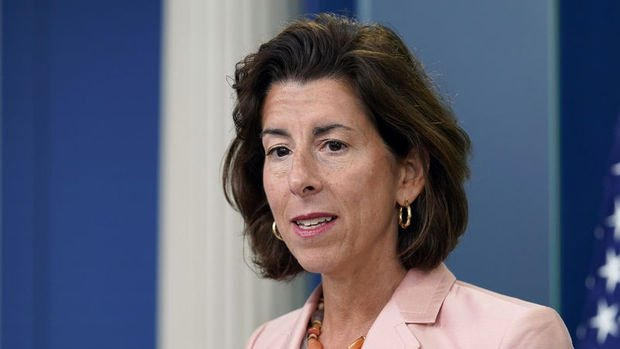US Trade Secretary Raimondo Visits China
US Commerce Secretary Gina Raimondo will visit China at a time when American companies doing business in China are increasingly concerned about the investment environment due to the increasing geostrategic competition and political tensions between the two countries. Expected to arrive in China today for a four-day visit, Secretary Raimondo will hold talks in Shanghai and the capital Beijing. Raimondo will meet with Communist Party of China (CPC) Shanghai Secretary Cing Jining and representatives of the American Chamber of Commerce (AmCham) in Shanghai, and is expected to meet with her counterpart Wang Vintao and other officials in Beijing. The US Secretary’s visit comes at a time when American investors doing business in China are experiencing increasing economic competition, especially in the technology sector, and global geopolitical tensions between the two countries. The business world is concerned about political tensions The “China Business Climate Survey” conducted in March by AmCham, which has more than 1,000 registered members in Shanghai, China’s commercial and financial center, revealed that for the first time in the last 25 years, the majority of American companies do not see China as an “investment priority.” While 45 percent of the companies participating in the survey listed China among their “top 3 priority countries for investment,” 55 percent did not. On the other hand, 45 percent of the companies stated that the business environment in China was “deteriorating,” and expressed the view that the most important problem was “increasing tensions between the U.S. and China.” Raids on American consulting companies Secretary Raimondo is expected to raise with her Chinese counterparts during her visit her concerns about data security and national security-related blocking of American companies’ market access. Chinese security agencies have raided the offices of US-based international auditing and consulting firms such as Bain&Co, Mintz and Capvision and conducted investigations, raising concerns that the line between “state secrets” and open market information needed to make investment decisions is blurring. In May, the Beijing office of auditing firm Mintz, the Shanghai office of consulting firm Bain&Co, and the Shanghai, Beijing, Sucou and Shinjin offices of market research firm Capvision were raided. Mintz, one of the firms under investigation, was fined $1.5 million on Aug. 22 for “conducting unapproved statistical work.” Concerns over the “chip war” On the other hand, the mutual restrictive measures triggered by the increasing competition between Washington and Beijing in high-technology, especially in semiconductors, are also raising concerns in the business community. Following a cybersecurity investigation into US microchip maker Micron Technologies, China banned the company from selling chips and integrated circuits to Chinese firms running critical infrastructure projects. It is anticipated that Raimondo will use the ban imposed on Micron as an example, as well as bring up the problems regarding market access of American companies. On the other hand, the US has also recently demonstrated its intention to hinder China's technological development in the sector with the export controls and technology restrictions it has imposed on Chinese companies in the chip sector. US President Joe Biden, with the executive order he signed on August 10, imposed restrictions on venture capital and equity partnership investments by American companies in China in three critical technology areas, namely semiconductors and microelectronics, quantum information technologies and certain artificial intelligence systems. The decree, which coincides with the anniversary of the Chip and Science Act passed in 2022, shows Washington's insistence on hindering China's technological capabilities in this area with investment controls after export restrictions in the chip sector. China is "concerned about unilateral measures" The Beijing administration, on the other hand, expects the US to clarify its policy on export controls and investment restrictions in the technology sector during the visit. Two days before Raimondo’s visit was announced, the U.S. Commerce Department announced on Aug. 21 that it had removed 33 companies, including 27 Chinese companies, from its export control “watch list.” The Chinese Commerce Ministry said in a statement that Washington’s decision would “contribute to normal bilateral trade.” In a statement regarding Raimondo’s visit, Commerce Ministry Spokesperson Şu Cüeting said that “China will declare its position on urgent trade issues.” Arguing that the difficulties in bilateral trade and investments “are due to the unilateral and protectionist actions of the U.S.,” Spokesperson Şu said, “We hope to resolve trade disputes between the two countries and make progress in discussions on practical cooperation.” Fourth high-level visit by the U.S. administration Raimondo’s visit will be the fourth high-level visit by Biden administration officials to China this year. Following U.S. Secretary of State Blinken’s visit in June, Treasury Secretary Janet Yellen and Special Envoy for Climate Change John Kerry visited the country in July. In addition, former White House National Security Advisor and US Secretary of State Henry Kissinger also visited Beijing in July and was received by Chinese President Xi Jinping.


